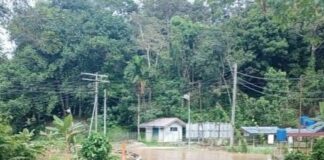KOTA KINABALU: The Federation of Chinese Associations Sabah (FCAS) has urged the federal government to reconsider its decision of raising the threshold of the windfall tax for the palm oil sector in Sabah and Sarawak, from RM3,000 to RM3,500 while the levy rate in the two states will be aligned with the peninsula at 3.0 per cent.
Its President, Tan Sri T.C Goh proposed the federal government to discuss the matter with the Sabah and Sarawak state governments to find a better solution.
He said, prior to announcing the said move, the federal government must have ignored the fact that presently there’s a 7.5% of palm oil sales tax being imposed by the Sabah state government, hence any additional tax imposed is definitely be a ‘double taxation’ which will inevitably incur tax burden to the oil palm industry players.
He opined that, prior to introducing the said taxation the federal government and the Ministry of Finance (MoF) should first engage with the industry players to seek their views on the matter, so as not to increase their tax burden.
“The government should discuss the matter with the industry players, if possible to maintain the existing tax regime, or to reach consensus for an acceptable adjustment,” he said.
Goh, who is also a member of the Sabah Economic Advisory Council (SEAC) , urged this in a statement issued today. He was responding to the federal government’s decision to raise the threshold of windfall tax and the levy of oil palm sector in the country, Sabah and Sarawak included, as announced by Finance Minister Tengku Datuk Seri Zafrul Abdul Aziz in Parliament, while tabling the 2022 Budget tabled, on Friday.
Goh said, the imposition of the windfall tax or raising of the levy of palm oil sales would especially have a far-reaching impact on Sabah’s palm oil sector, as it is the largest palm oil producer in the country where last year alone, it produced a total of 4.65 million metric ton of palm oil.
“From another perspective, if the federal government is to proceed with raising the threshold of the windfall tax and levy for the palm oil sector, it would directly affect the state government’s collection of the sales tax currently imposed on the oil palm sector,” he said.
He nonetheless welcomed and supported the government allocation of RM35 million to implement a replanting scheme by smallholders to further support the palm oil industry, and another RM20 million to counter international anti-palm oil activities.
He also reminded that, although the global oil palm price has improved in recent years, it was barely enough to make up for the losses incurred when the oil palm market plummeted in the last few years. Besides this, the oil palm sector is currently still facing an acute shortage of workers.
He further noted that the federal government’s decision of aligning the oil palm levy rate in Sabah and Sarawak at the same rate as the peninsula at 3.0 percent, coupled with other factors, would further increase the operation and production cost of the oil palm sector in the two states and would inevitably affect their production and profit margin. He thus hoped the government could take serious note of such a situation and to make necessary adjustments to the taxation, besides providing the necessary support and assistance to the oil palm growers.
Meanwhile, Goh pointed out that although the federal government through the 2022 Budget has increased the development funding for Sabah from RM5.1 billion this year to RM 5.2 billion next year, the said allocation was nonetheless same as the RM5.2 billion allocated for Sabah in 2020.
He thus opined that the federal government should further increase the allocation for Sabah, in order to accelerate development of the state.
Goh who is also President of the Federation of Sabah and Labuan Hokkien Associations (FSLHA) also welcomed the various constructive measures introduced in Budget 2022 to benefit Sabah and Sarawak, such as the allocation of RM3.5 billion for the implementation of infrastructure development projects worth RM3.5 billion including the Pan Borneo Highway and Central Spine Road and RM746 million for upgrading of dilapidated schools in Sabah and Sarawak, where a substantial sum will be for such schools in Sabah with 112 projects, and RM1.5 billion for rural infrastructure development in the two states; RM200 million to subsidise fuel and transportation cost in Sabah and Sarawak to keep the inflation rate low; a subsidy of RM209 million for airline services to rural areas in Sabah and Sarawak; and to construct addition of eight control posts for the General Operations Forces at Pagalungan, Sabah and Temong Mura, Sarawak to beef up security and control of the borders; to set up breast milk banks in government hospitals; to continue with development of Sabah industrial corridors; and to provide 5G internet broadband service in major towns in Sabah, next year.
He hoped that in line with its “Malaysian Family” concept, the Perikatan Nasional (PN) government could continue to pay greater attention to Sabah, and to allocate more allocations for development of various sectors in the state, so as to further improve the people’s standard of living standard and wellbeing.


